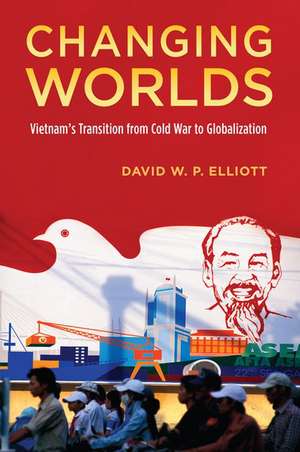Changing Worlds: Vietnam's Transition from Cold War to Globalization
Autor David W. P. Elliotten Limba Engleză Paperback – 3 apr 2014
| Toate formatele și edițiile | Preț | Express |
|---|---|---|
| Paperback (1) | 303.46 lei 31-38 zile | |
| Oxford University Press – 3 apr 2014 | 303.46 lei 31-38 zile | |
| Hardback (1) | 447.25 lei 31-38 zile | |
| Oxford University Press – 11 oct 2012 | 447.25 lei 31-38 zile |
Preț: 303.46 lei
Nou
Puncte Express: 455
Preț estimativ în valută:
58.07€ • 60.63$ • 48.06£
58.07€ • 60.63$ • 48.06£
Carte tipărită la comandă
Livrare economică 24-31 martie
Preluare comenzi: 021 569.72.76
Specificații
ISBN-13: 9780199377589
ISBN-10: 0199377588
Pagini: 448
Ilustrații: 12 b/w photographs
Dimensiuni: 231 x 155 x 31 mm
Greutate: 0.61 kg
Editura: Oxford University Press
Colecția OUP USA
Locul publicării:New York, United States
ISBN-10: 0199377588
Pagini: 448
Ilustrații: 12 b/w photographs
Dimensiuni: 231 x 155 x 31 mm
Greutate: 0.61 kg
Editura: Oxford University Press
Colecția OUP USA
Locul publicării:New York, United States
Recenzii
Changing Worlds is a valuable contribution to the field of Vietnam studies. What distinguishes it from many geo-economic and geopolitical narratives on Vietnam, is that this book provides readers with an alternative, context-sensitive explanation for the shift of the collective mind-set of the Vietnam elite. This book should be read by all scholars and students of Vietnam studies and international studies.
Notă biografică
David W. P. Elliott is H. Russell Smith Professor of Government and International Relations at Pomona College. Upon completion of a year of Vietnamese language training at the Defense Language Institute, Elliott served with the U.S. Army in Vietnam from 1963-65. In 1965, he joined the Rand Corporation, and supervised part of its "Viet Cong Motivation and Morale Study" in Dinh Tuong province in the Mekong Delta until the end of 1967. During the course of graduate study at Cornell University, he returned to Vietnam to do research in 1971-72 and has returned to Vietnam nine times in the post 1975 period to do research, attend conferences, and participate in educational exchanges. Elliott was a participant in the U.S.-Vietnam Dialogue sponsored by the Aspen Institute and organized by former Senator Dick Clark in the 1980s and early 1990s and accompanied Senator Clark to Vietnam in 1991 for meetings with leading Vietnamese figures.














